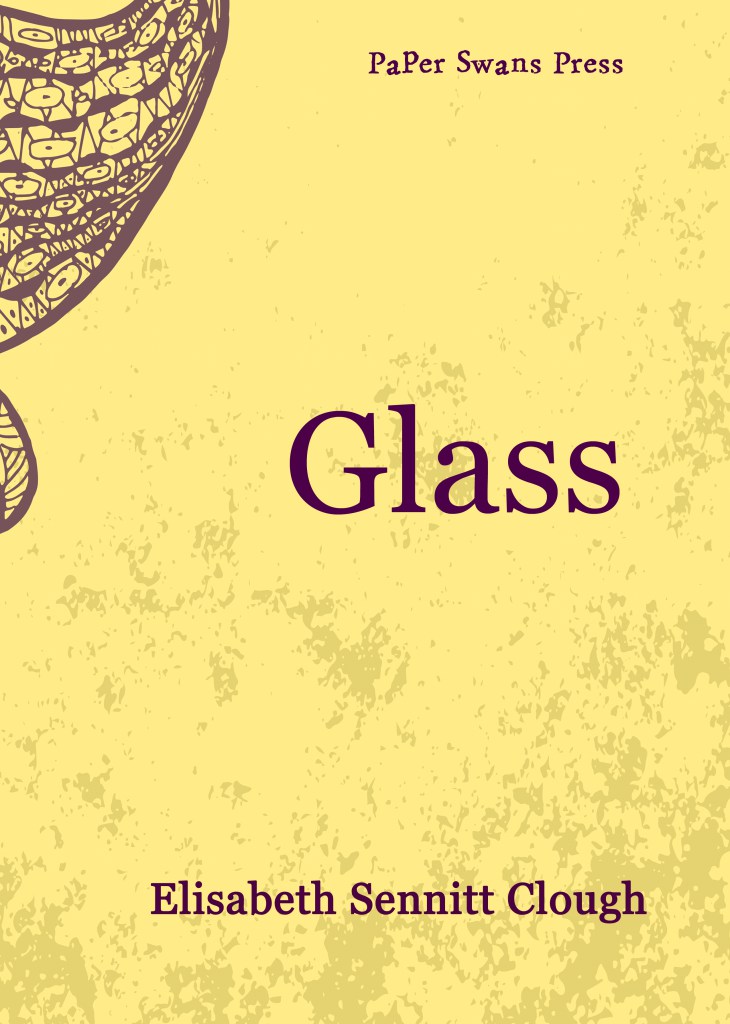Glass is Elisabeth Sennitt Clough’s first collection and she immediately draws us into a bleak, desolate world, with open skies, dark earth, shame and secrets.
She is a new voice rising from the Fens, from a desolate murky landscape, she shines with the sharp glint of steel and glass. Sennitt Clough’s skill is to keep holding you down into her poems as you read them. Her skill displays the nature of the fen. The soil of the poetry goes deeper then you dare, takes you insistently downward and it’s effect is mesmerising, uncomfortable and powerful.
Her first poem Sightings is full with rich colours, internal rhyme and we understand this is the “rarest of gifts”, a totem of the poet, a peacock, a strange bird inside a family, trying to understand it’s own distorted reflection and escape. Be we can’t flee the horror of the “slow slow grab”. She tells us “our home was full of hooks”.
It is satisfying that Sennitt Clough keeps us located and rooted to a place. A recurrent theme in her collection is machinery. In The Yard at Waterside we find “vinegar sharpness” and a “pox of rust” and we walk with her into the machinery of the past. As we travel through sharp images, we sense we are colluding, sometimes knowingly. She has us questioning what is myth and truth. Her use of couplets is interesting – she uses them to control the flood of emotions and typically loosens them towards the end of her poems where they merge with a bigger chaos – or is it freedom?
Another theme recurrent in Glass is curiosity and how this is controlled. Green-Eyed is a great example of both the control and wildness in her poetry. She gives us lenses with a “mutation in her eyes”. One of the most moving poems of this collection (and there are many) is My Father’s Coat, where the daughter dresses in the magic of her father into a woven legend of strangeness.
The Collection is in three parts, each with a layer of distortion and revelation. She shows us the murk of the fens, the truth behind the fairy tales. In the excellent Codes of Behaviour in a Canbridgeshire Village the sagging and oozing takes on it’s own personality, you want to stop looking, stop reading – but you can’t. Her S sounds in the poem are like a hissing, this poem hurts.
She gives us motifs of water spilling into earth, machinery that tries to control by brutalising, the need to look deeper are all engineered to remarkable effect in this collection. She manages with skill to use long lines in poems such as Potato Season to echo the big Norfolk skies.
In Fidget words like “wrist flicks” have a great effect showing us anger and loss of control and the confessional Glass Collar where the poet writes that revelation can be it’s own prison.
This collection stays with you, seeps into you with all the bleakness of the Fens. It also cries out to the reader, holds us in it’s looking glass. It does what poetry is meant to do – makes you clutch it to your chest and cry while not knowing why because the poet is unsentimental, brutal, sharp and full of wild colours.
Order your copy of Glass by Elisabeth Sennitt Clough from PaperSwans Press, here: http://paperswans.co.uk/glass/
Jessica Mookherjee has a background in Biological Anthropology and public health research. She was shortlisted for the Fairacre first pamphlet competition in 2016. Her work has been published regularly and widely in publications such as The Interpreter’s House, Brittle Star, Tears in the Fence among many others. Her pamphlet – The Swell was published by Telltale this Autumn.

